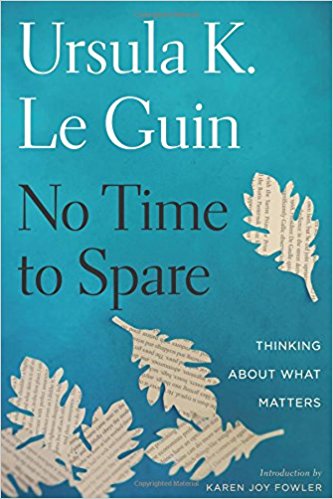Review by Melanie Holmes
In No Time to Spare: Thinking About What Matters, Ursula K. Le Guin gives us a collection of her last published thoughts. After its release, at 88, Le Guin died just 33 days later.
Known for her science fiction and poetry, the essays in this book delve deep and reveal her roots as the daughter of an anthropologist and her childhood summers at a “tumble-down” ranch that attracted people from various walks of life, including scientists and Native Americans. No Time to Spare spotlights her foray into the world of blogging, which she embraced once she realized how it worked. Even as she takes on hot topics such as politics and gender equality, she intersperses stories of her cat, Pard, in which we find surprising nuggets for digestion.
Going Over Eighty

Ursula Le Guin
Le Guin begins “Part One: Going Over Eighty” with an essay aptly named, “In Your Spare Time.” As she fills out a questionnaire on the 60th anniversary of her college graduation, she stares at the question of how she spends her “spare time” and the little checkbox next to “Creative Activities” (paint, write, etc.). As a prolific author who submitted her first story to a magazine at age 11 and whose work has addressed feminism, anarchy, and sociology, this question caused her to contemplate how she thinks about time and what matters. In Part One she also writes about American’s propensity to espouse, “You’re only as old as you think!” Her response will resonate with many readers and should give pause to all.
The Lit Biz
In “Part Two: The Lit Biz,” Le Guin examines evolutions that have taken place in language. Known for her book in the 1960s that foreshadowed the rise of the transgender community, Le Guin takes on the prevalence of the word “fuck,” with its “overtones of contempt.” Which brings us to her professed obsession with words and how their meanings change with time and with place. When readers ask Le Guin what her stories or essays mean, she asks, “What is it that matters to you about what I wrote?” The remaining essays in Part Two look at how literature treats other topics of import, including war, heroism, gender equality, and the alluring idea of The Great American Novel.
Trying to Make Sense of It
In “Part Three: Trying to Make Sense of It,” Le Guin’s musings range from male solidarity that has shaped the great institutions of the world, such as religion, government, and the corporation, to humans’ willingness (or lack of it) to stir up the status quo—to make “trouble” (as her cat Pard does daily). As poets aptly do, in each essay Le Guin says a lot with few words. No topic gets a free pass, so prepare yourself for the provocative and politically incorrect as you read her take on hot topics such as abortion, overpopulation, climate change, immigration, and what Catholics consider “holy.”
As she examines the American Dream—prosperity for all—she takes aim at politicians and what keeps them in power, as well as why they promise what the masses want “right now” rather than taking a long-term view. I especially appreciated the chapter, “Clinging to a Metaphor,” because of Le Guin’s rebuttal of capitalism’s claim that economic growth at all costs is desirable, when in fact it is capitalism’s failure to adapt that endangers Earth and its denizens.
Rewards
Be it appreciation for the present moment (versus the almighty chant to multitask) or the importance of community and connection, Part Four summarizes “Rewards” that Le Guin sees in life—for all of us. She ends with an ode to nature that only she can do.
As her final word on what matters, Le Guin hammers in the nails with precise aim…despite, or because of, her age. Readers of all ages will appreciate Le Guin’s vast envelope of knowledge and her words that will urge you to consider what really matters to you.
Melanie Holmes is the author of The Female Assumption: A Mother’s Story, Freeing Women from the View that Motherhood is a Mandate, which won a 2014 Global Media Award from the Population Institute.

